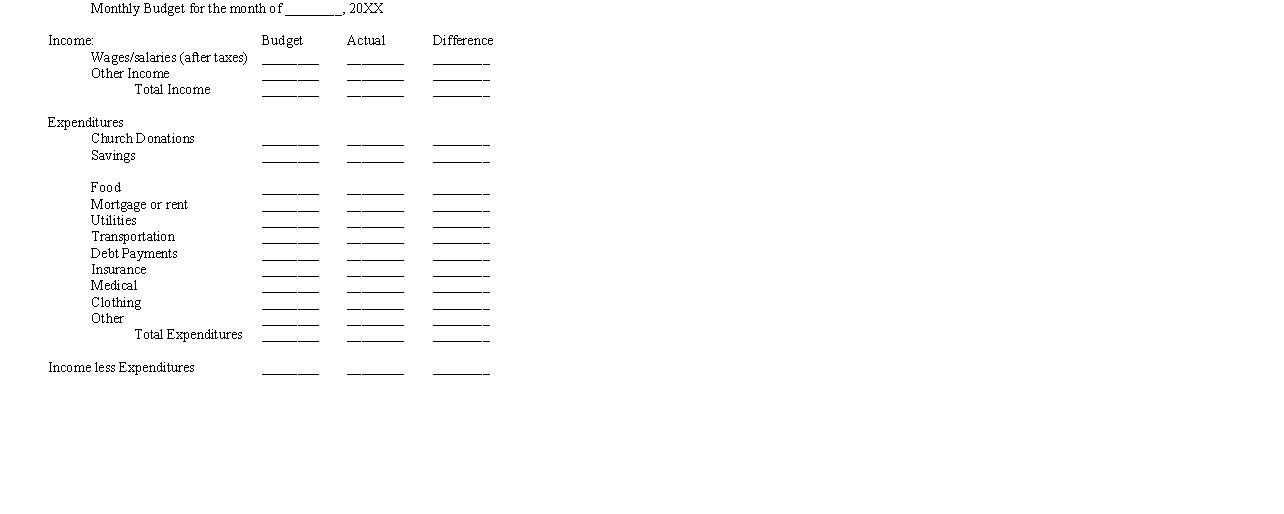- Budgeting
- Cash Management
- Consumer and Mortgage Loans
- Debt and Debt Reduction
- Time Value of Money 1: Present and Future Value
- Time Value of Money 2: Inflation, Real Returns, Annuities, and Amortized Loans
- Insurance 1: Basics
- Insurance 2: Life Insurance
- Insurance 3: Health, Long-term Care, and Disability Insurance
- Insurance 4: Auto, Homeowners, and Liability Insurance
- The Home Decision
- The Auto Decision
- Family 1: Money and Marriage
- Family 2: Teaching Children Financial Responsibility
- Family 3: Financing Children’s Education and Missions
- Investments A: Key Lessons of Investing
- Investments B: Key Lessons of Investing
Develop and Implement a Budget
To determine where you are financially, you must first understand financial statements. Financial statements are documents that accurately reflect your personal financial position at a specific point in time. Financial statements help you evaluate your financial health.
There are several different kinds of financial statements. A budget records expected income and spending for the future, generally for a month or a year. A balance sheet records your assets (what you own) and liabilities (what you owe) at a specific point in time, usually at the end of a month, quarter, or year. An income statement records spending over a specific period of time, generally a month or a year. From a perspective point of view, a budget is planning for the future, a balance sheet is a record of the present, and an income statement is a record of the past.
Every company uses financial statements to determine how their business should be run in order to achieve their shareholders' goals. Similarly, individuals and families can use financial statements to help them understand where they are financially and to help them meet their goals.
Using a budget effectively will have a greater impact on whether or not you will achieve your financial goals than any other change you could make to your financial habits. On this topic, President Spencer W. Kimball said:
Every family should have a budget. Why, we would not think of going one day without a budget in this Church or our businesses. We have to know approximately what we may receive, and we certainly must know what we are going to spend. And one of the successes of the Church would have to be that the Brethren watch these things very carefully, and we do not spend that which we do not have (Spencer W. Kimball, Conference Report, April 1975, pp. 166-167).
If one of the successes of the Church is that the Brethren watch the Church’s budgets carefully, shouldn't we, as individuals and families, watch our own budgets carefully as well?
In addition to keeping a record of expected income and expenses for the coming month or year, a budget is a way of making sure your financial resources are being used for the things that matter most to you—your personal and family goals.
While it is fairly easy to record your cash inflows and outflows and to make plans for achieving your financial goals, it takes discipline and sacrifice to actually follow through on the plans you outlined in your budget. While not easy, the results are apparent. Research has shown that those who effectively budget accumulate more wealth than those who do not. (See John Ameriks, Andrew Caplin, and John Leahy, “Wealth Accumulation and the Propensity to Plan,” National Bureau of Economic Research, Working Paper 8920, May 2002, p. 2 which states “It appears that this detailed monitoring activity helps households to save more and to accumulate more wealth”).
However, since an effective budget is likely the most important factor in helping you attain your personal goals, you should take time to create one now and create it well.
There is a process to creating an effective budget. It is:
- Know what you want to accomplish.
- Track spending.
- Develop a cash budget.
- Implement your budget.
- Compare your budget to your actual expenses and make changes where necessary to achieve your goals.
An example of a budgeting is found in Chart 1. In addition, examples of more detailed budgeting spreadsheets (Learning Tool 4: Budget, Balance Sheet, and Financial Statements Worksheet and Learning Tool 31A: Debt Free Planned Spending Spreadsheet) can be found in the Learning Tools section of the Website (TT04 and TT31).
Chart 1. Budget Example


